Using a solar water heater offers numerous benefits to you as an individual and the society as a whole. Nonetheless, several factors will influence your decision to utilize solar for your water heating needs, the most important being climate.
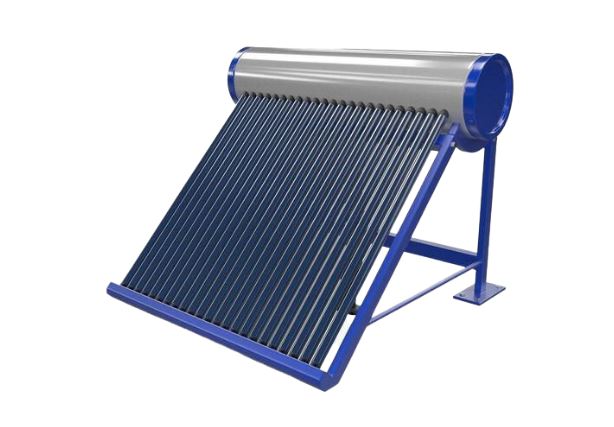
Installing solar water heating is only practical where there’s considerable exposure to sunlight during the day. However, some primary benefits to using solar water heating are discussed herewith:
1. Reduced Energy Bills
Even though initial capital for installation can be higher, the long-term savings on energy bills can quickly offsets this investment.
While hot water has become more of a basic need in households, it is expensive given its huge energy needs. It is thought that the average household spends over 18% of its energy needs on heating water. Most of this energy is generated from gas and oil.
The National Renewable Energy Laboratory (USA) opines a switch to solar water heating can save up to 80% of energy related bills annually. The primary advantage of a solar water heater is it uses sunlight that is freely available and renewable.
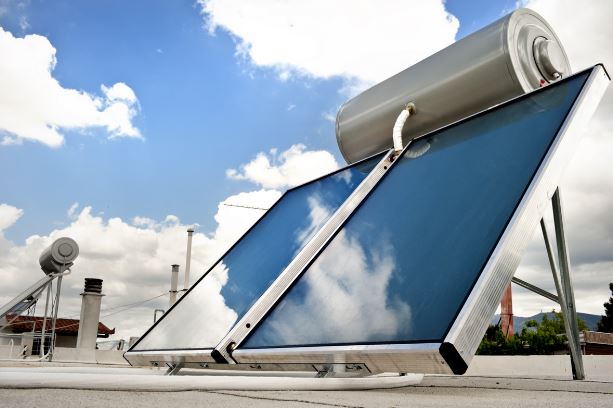
For a standard family utilizing 100 liters a day, switching to solar water heating can save up to 1500 units annually. This amounts to hundreds of dollars in savings depending on the area’s unit cost of power and the water usage.
2. Long-Term Savings
The cost in installing a solar water heating system for the first time can be higher compared to conventional water heaters. Nonetheless, savings gain over time on energy bills can recoup the initial investment.
These savings are furthered by the long service life of solar water heaters which easily surpasses 20 years. Furthermore, the required maintenance is minimal compared to conventional water heaters which reduces the costs further.
Additionally, the long-term savings are compounded given you are less susceptible to energy price fluctuations and shortages. With this independence, you are assures of some financial security especially in the event of rising energy costs.
Solar water heaters eventually result in a positive return on investment through savings on energy bills which surpass the initial investment. The payback period is subject to factors like incentives, initial cost and local energy prices.
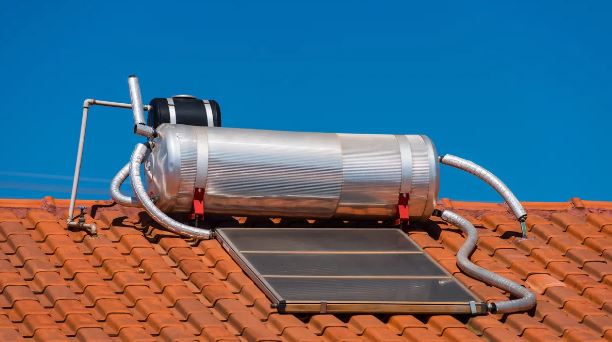
Ideally, the payback period can range anywhere between 4 and 8 years for a standard solar hot water system. Moreover, replacing a diesel-powered boiler with a solar water heater can save over 100 liters besides minimizing greenhouse gas emissions.
Table 1: The table below shows a summary of the average payback period when replacing an
energy source with solar:
| Energy Source Replaced By Solar Energy | Average Payback Period (Years) |
| Electricity | 3-4 |
| Gas | 4-6 |
| Diesel | 4-5 |
3. Renewable Energy Source
Since solar power is a renewable and sustainable energy source, using a solar water heater reduces reliance on non-renewable resources. You can therefore, utilize solar energy repeatedly over time without depletion.
Non-renewable sources, like fossil fuels result in greenhouse gas emissions and rejecting them for solar water heating solutions helps combat climate change. The sun’s energy is expected in perpetuity while fossil fuels and other non-renewable energy sources are on course to be depleted.
4. Environmental Benefits
Conventional water heaters based on fossil fuels produce harmful emissions contributing to the pollution of air. Solar water heaters produce clean energy that is pivotal in reducing your carbon footprint and environmental impact.
Research has shown using a single solar water heater can reduce the carbon footprint by 1850 kg annually. Comparatively, a typical water heater releases about twice that much carbon emissions at 4000 kg annually.
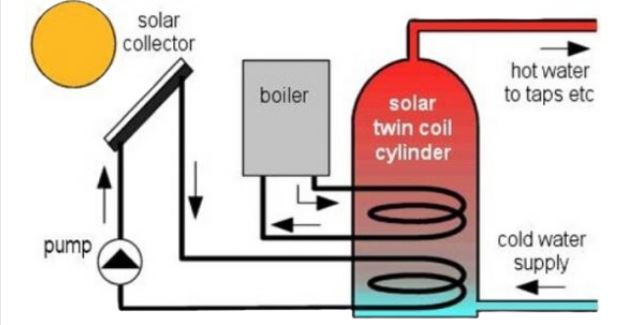
Using a solar water heater offers numerous environmental benefits some of which are listed below:
Reduced Greenhouse Gas Emissions
Since solar water heaters utilize the sun’s energy, they eliminate need for fossil fuels like natural gas, coal and oil. As such, they significantly lower greenhouse gas emissions which include pollutants like carbon (IV) oxide. This strengthens efforts to combat climate change and its associated environmental impacts.
Reduced Air Pollution
Using solar water heaters instead of water heating methods relying on fossil fuels results in a considerable reduction in air pollutants. Some of these pollutants include particulate matter, sulfur (IV) oxide and oxides of nitrogen oxides. These pollutants are the main culprits in issues of air quality like smog and respiratory illnesses.
Conservation of Water Resources
The design implemented with some solar water heaters allows for efficient storage and distribution systems, useful in water conservation. These designs reduce the amount of water wasted during the heating process. As a result, it supports efforts geared towards water conservation especially for areas with scarcity.
Decreased Dependency on Fossil Fuels
The widespread use of solar water heaters contributes to a decreased reliance on fossil fuels. The need for activities such as drilling, mining, and transportation related to using these fuels is reduced. Ultimately, this helps in mitigating the environmental impact associated with their extraction, production and use.
Mitigation of Urban Heat Island Effect
Adopting solar water heaters in urbanized settlements can slightly reduce the effect of urban heat island. Traditional methods of heating water like using electric heaters, contribute to the overall amount of heat generated in urban environments. Meanwhile, solar water heaters only convert the sun’s energy for heating water without adding extra heat to the surroundings.
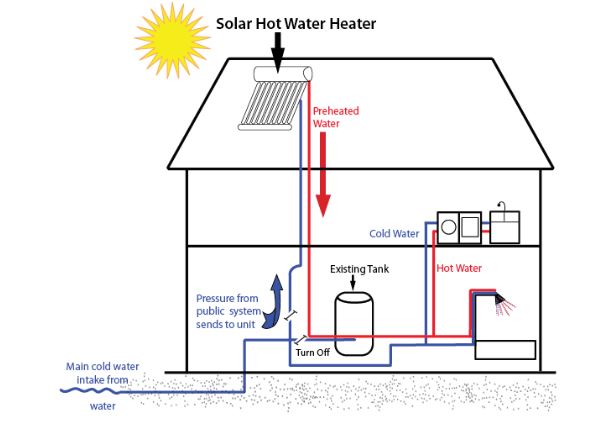
Low Environmental Impact During Operation
Upon installation of solar water heaters, they have relatively low environmental impact when operating. They function quietly without noise generation, particulate or gas emission, or waste production making them an eco-friendly choice.
5. Government Incentives
Various governments the world over offer incentives and support programs to accelerate adoption of solar water heaters alongside other renewable technologies. This empowers efforts to build a more sustainable and cleaner future for energy.
Such incentives serve to reduce initial costs of installation, enhance energy security, promote environmental sustainability and reduce greenhouse gas emissions. While the specific incentives may vary with the country or region, they may include:
Expedited Licensing and Eased Regulations
Governments may simplify the permitting process for installing solar water heaters and ease regulatory burdens. This way, more consumers find it convenient to adopt this technology.
Feed-in Tariffs
These could be in form of financial compensation to individuals or businesses generating electricity from their solar water heaters. Such a step encourages the use of renewable energy technologies allowing homeowners or businesses to recover their initial investment earlier.
Grants and Subsidies
Some governments will offer grants and subsidies in the purchase of solar water heaters to support their installation. Consequently, these funds can be utilized in covering some of the system’s cost making it more affordable.
Low-Interest Loans
Government agencies can provide special financing programs or low-interest loans for individuals and businesses to finance installation of solar water heaters. These loans feature favorable terms, simplifying the path for people interested in investing in renewable energy technologies.
Net Metering
Policies of this kind by governments allows owners of solar water heater to receive credit for electricity generated via these installations. These credits can offset future electricity bills, further incentivizing the adoption of solar technologies.
Renewable Energy Certificates
Governments may offer these certificates to represent the environmental attributes offered by using solar thermal energy for water heaters. Recipients can then trade or sell these certificates to entities looking to offset their carbon footprint like utility companies.
Tax Credits and Rebates
Some administrations will offer rebates or tax credits to individuals or enterprises that install solar water heaters. Tax credits allow for the deduction of a percentage of the system’s cost from their tax liability. On the other hand, rebates provide direct cash incentives after completing an installation.
6. Long and Useful Lifespan
The lifespan of solar water collector heaters far extends that of conventional water heaters extending to over 20 years with proper maintenance. They are therefore an attractive investment when seeking to lower long-term energy costs and reduce environmental impact.
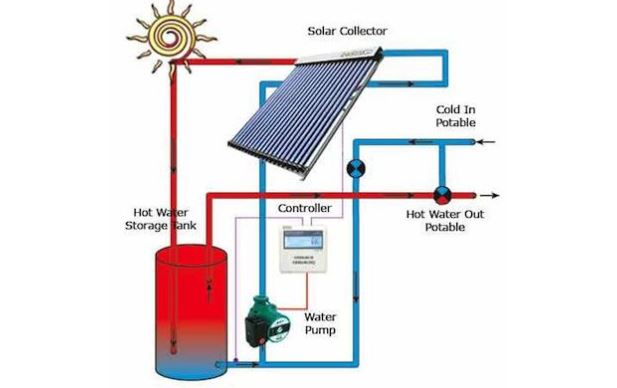
Material Durability
Highly durable materials with great weathering and corrosion resistance properties are utilized in the construction of solar water heaters. They therefore ensure the system can withstand exposure to the elements over a long period.
Low Operating Costs
The operating costs associated with solar water heaters are low since they rely on freely available solar energy. Furthermore, they lack an abundance of mechanical components usually subject to wear and tear allowing an issues free life.
Maintenance and Care
A solar water heater will serve you well with proper care and regular maintenance. Carrying out routine inspections for issues like leakages will assist in identifying issues early before they become a problem.
Manufacturer Warranties
The warranties provide by manufacturers to solar water heater have long validity periods providing coverage for potential issues. Consumers therefore place confidence in their durability and performance.
Passive Systems
Many solar water heating systems utilize natural convection action to circulate water simplifying their operation allowing long use.
Protective Features
Safety features provided with these systems like freeze protection and pressure relief valves prevent damage to components in extreme situations. This ensures they work for longer without breaking down.
Design Simplicity
The straightforward design applied to solar water heaters reduces their potential for wear and mechanical failure over time. Their low component count translates to reduced areas of potential failure and thus increased system reliability.
Weather Resistance
These water heaters are designed to withstand extreme conditions like heavy snow and rainfall, and extreme temperatures. Their utilization of proper insulation and weatherproofing protects the system from damage or degradation.
7. Low Maintenance Needs
Upon installing a solar water heater, you require very little maintenance limited to occasional cleaning and regular checks for efficient operation. The low maintenance needs are thanks to their simple and reliable design that ensures potential for issues is low.
The low maintenance needs for solar water heaters can also be attributed to the following:
- Solar water heaters utilize materials with superior qualities in their construction ensuring the system avoids significant wear and tear.
- The absence of many moving parts and fixtures like pumps reduces the likelihood of mechanical failures.
- These water heaters demand minimal user intervention once installed, reducing chances of user-induced errors that arise from constant monitoring.
- Many solar water heaters operate passively, relying on natural convection to circulate water through the system.
- Incorporation of safety features targeted for issues like pressure build up and freezing conditions offer inherent protection form damage.
- Self-cleaning features built into these water heaters like glass covers allow rainwater to wash away dirt and debris.
8. Increased Property Value
The prominence of renewable energy solutions and environmental awareness has perked the interest of potential homebuyers in eco-friendly and energy-efficient features.
This can happen in the following ways:
Cost Savings
By utilizing solar water heaters, reliance on electricity or gas energy sources reduces resulting in substantial savings on utility bills. This is an attractive benefit for any potential buyer as the savings can be significant and reinvested elsewhere.
Energy Efficiency
Homebuyers are on the search for energy-efficient features that can save money and also spearhead a greener lifestyle. Solar water heaters offers both benefits due to their eco-friendly set up.
Energy Independence
Homes with solar water heaters offer potential owners some energy independence, reducing grid reliance. When marketing a property, this feature can be especially appealing to buyers concerned about energy security and price fluctuations.
Government Incentives
Many countries offer financial incentives like tax credits to homeowners with renewable energy installations like solar water heaters. These incentives add value to the property increasing their attractiveness to buyers.
Green Certification and Recognition
Some areas have certifications and ratings for green buildings which consider availability of eco-friendly features like solar water heaters. As a result, such properties may be perceived as more valuable for their positive environmental impact.
Long-term Investment
Solar water heaters have an extended lifespan. This can appeal to a buyer knowing they won’t need to invest in a new water heating system for a considerable period.
Lower Carbon Footprint
Properties with smaller carbon footprint like utilizing solar water heaters are an emerging trend. Having a home with sustainable features allows environmentally conscious buyers to align their lifestyle with their values.
Resale Appeal
As the world gears towards sustainability and environmental consciousness, properties with solar water heaters are competitively advantaged in the market. Buyers and speculators may offer premium rates for properties with renewable energy solutions.
9. Energy Independence
Homeowners and enterprises utilizing solar energy for water heating enjoy some degree of energy independence. How? Solar water heating reduces reliance on the main grid and fossil fuel supplies. This buttresses energy security in case of an energy crisis, cost fluctuations, or disruption in supply.
Furthermore, solar water heaters reduce individual demand for electricity or gas supply resulting in low energy consumption. Accordingly, there’s reduced strain on power plants reliant on non-renewable energy sources like nuclear power and fossil fuels.
10. Reduced Water Heating Demands
Water heating is an essential function in domestic and commercial premises uses for bathing, washing, cleaning and heating (space). By utilizing solar energy, you reduce the demand for electricity or gas-powered heating systems, and energy consumption in overall.
Some ways in which solar water heaters can significantly reduce water heating demands are described below:
Solar Energy Utilization
Solar water heaters use solar collectors to capture sunlight, absorb inherent radiation and convert it into heat. This renewable energy source can be used to replace or supplements standard water heating methods relying on fuels, electricity or gas.
Preheating Water
When integrated to existing conventional water heating systems, solar water heaters can be used to preheat the water prior. This way, the conventional heater utilizes less energy in achieving the desired temperature.
Backup Heating System
Solar water heaters can incorporate backup heating systems relying on other energy sources. Such stabilizes hot water supply during periods of low solar availability like winter, overcast days and night.
Storage
Storage tanks are a common integration of solar water heating systems holding hot water for later use. An ample capacity can allow storage of excess supplied hot water during peak production times reducing need for a backup system.
Seasonal Variations
The effectiveness of solar water heaters in colder seasons has been improved especially in warmer climates such as around the equator. Nonetheless, these systems can still reduce water heating demands for colder areas during the warmer months.
Energy-Efficient Design
Solar water heaters are engineered to optimize heat transfer and minimize heat loss incorporating insulation in their infrastructure. This helps retain captured heat, ensuring maximum efficiency and reduced need for continuous heating.
11. Contribution to a Sustainable Future
Choosing a solar water heater aligns with global efforts to transition to more sustainable and eco-friendly practices. By making this small yet massive change, you become part of a larger movement marching towards a greener future.
Solar water heaters play the following role in building a sustainable future:
Reduced Pollution
Burning fossil fuels to generate electricity and/or heat water results in air pollution which is reduced by converting to solar water heaters. This cuts down on the atmospheric concentration of harmful gases like oxides of sulfur and nitrogen improving air quality.
Energy Efficiency
Since sunlight is readily available, using solar water heaters is energy-efficient translating to lower environmental impact.
Green Job Creation
Continuous adoption of solar water heaters increases demand in alternative renewable energy products stimulating job creation. A ripple effect in the direct chain from installation to maintenance creates opportunities for skilled workers contributing to economic growth.
Table 2: The table below shows the number of people employed in solar heating-related jobs for the
years 2017 to 2021 according to the International Renewable Energy Agency.
| Year | Employment |
| 2017 | 810,000 |
| 2018 | 800,000 |
| 2019 | 820,000 |
| 2020 | 820,000 |
| 2021 | 770,000 |
Global Impact
Adoption of renewable energy sources for applications like water heating by more people has a cumulative effect. This reduces energy consumption and emissions positively contributing to global efforts in climate change mitigation and sustainable development promotion.
Public Awareness
The more people embrace solar water heaters, the society is enlightened on sustainable energy alternatives and their benefits. Such awareness broadens the shift towards large scale adoption of renewable energy and sustainable practices.
Reduced Carbon Footprint
Replacing fossil fuel-reliant conventional water heating methods with solar water heaters significantly reduces greenhouse gas emissions. This combats climate change and its adverse effects on the planet from extraction, production and utilization of such fuels.
Renewable Energy Utilization
By harnessing the sun’s abundant and renewable energy in heating water pressure on non-renewable sources is reduced.
Conclusion
The centrality of solar water heaters in the pursuit of a sustainable future is undeniable given the global demand for heated water. Harnessing the sun’s energy which is clean and renewable will promote energy efficiency and foster new opportunities in a greener world.


